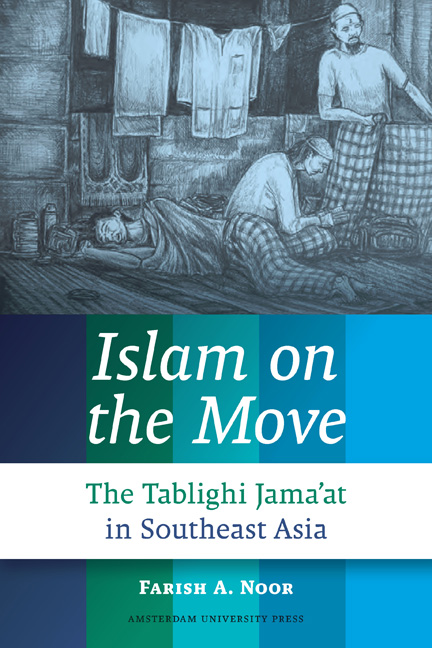Book contents
- Frontmatter
- Dedication
- Contents
- A Note on Proper Names and the Spelling Used in This Book
- Glossary
- Introduction: Brother Bismillah and My Introduction to the Tablighi Jama’at
- I At Home Across the Sea: The Arrival of the Tablighi Jama’at and Its Spread Across Southeast Asia
- II Learning to Be: The Foundational Literature of the Tablighi Jama’at and Its Role in Defining the Movement
- III Learning on the March: The Portable, Reader-friendly Literature of the Tablighi Jama’at and Its Role in the Self-identification and Reproduction of the Movement
- IV The Stories We Tell: The Conversion Narratives of the Tablighi Jama’at and the Internalisation of Tablighi Identity
- V Learning to Be Tablighi: The Rule-governed World of the Tablighi and the Disciplining of the Self
- VI How We Look and What We Are: The Tablighi Jama’at Framed in the Eyes of Others
- VII Finally, a Summing Up: The Tablighi Jama’at as the Complex Thing That It Is
- Notes
- Bibliography
- Index
V - Learning to Be Tablighi: The Rule-governed World of the Tablighi and the Disciplining of the Self
Published online by Cambridge University Press: 14 January 2021
- Frontmatter
- Dedication
- Contents
- A Note on Proper Names and the Spelling Used in This Book
- Glossary
- Introduction: Brother Bismillah and My Introduction to the Tablighi Jama’at
- I At Home Across the Sea: The Arrival of the Tablighi Jama’at and Its Spread Across Southeast Asia
- II Learning to Be: The Foundational Literature of the Tablighi Jama’at and Its Role in Defining the Movement
- III Learning on the March: The Portable, Reader-friendly Literature of the Tablighi Jama’at and Its Role in the Self-identification and Reproduction of the Movement
- IV The Stories We Tell: The Conversion Narratives of the Tablighi Jama’at and the Internalisation of Tablighi Identity
- V Learning to Be Tablighi: The Rule-governed World of the Tablighi and the Disciplining of the Self
- VI How We Look and What We Are: The Tablighi Jama’at Framed in the Eyes of Others
- VII Finally, a Summing Up: The Tablighi Jama’at as the Complex Thing That It Is
- Notes
- Bibliography
- Index
Summary
Pr. 241. It is what human beings say that is true and false; and they agree in the language they use. This is not agreement in opinion, but in a form of life.
Ludwig WittgensteinWhat is it to be in pain, and to say that one is in pain? Off-tangent though the question may seem at this point, its relevance lies in the fact that to make any knowledge-claims about the states of minds of others means being able to speak about their inner subjective states – be it to claim that a person is in pain or to claim that another person is committed to the Tablighi Jama’at.
Wittgenstein's answer to the question may come in the form of his public language theory, and the idea of language-use involves speaking language-games that are rule-governed exercises that take place in determined contexts. For Wittgenstein in the Philosophical Investigations, language-use is a rule-governed exercise that requires training and the learning of rules and norms. Wittgenstein takes the view that words mean what they do when we understand how they are used in a shared domain and when there is an agreement to the rules of signification among the language users.
On the basis of this argument, for Wittgenstein to talk about ‘pain’ in a meaningful way is not to refer to private sensations of pain, but rather to obey the rules of the language-game whereby talking about pain is possible. The meaning of ‘pain’ in public language is thus not tied to our internal, private experiences of it. Rather, ‘pain’ means what it does in the public domain when we agree on the use of the word, and when we have the outstanding circumstances (the ‘stage setting’, as Wittgenstein puts it) that goes into determining the context in which such a word makes sense in our use of it.
I raise this point at this stage of my enquiry simply to clarify the aim and focus of my study of the Tablighi Jama’at. When studying the history, development and modalities of a complex mass movement such as the Tablighi, I am less concerned about what each and every individual member of the movement thinks of it and how they privately identify themselves with it.
- Type
- Chapter
- Information
- Islam on the MoveThe Tablighi Jama'at in Southeast Asia, pp. 145 - 168Publisher: Amsterdam University PressPrint publication year: 2013



